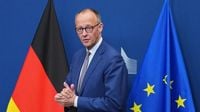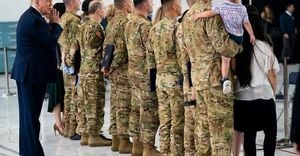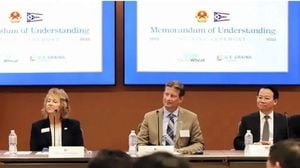BRUSSELS – German Chancellor Friedrich Merz has urged U.S. President Donald Trump to conclude his trade war and eliminate tariffs, emphasizing that escalating the customs dispute is not a viable path forward. "I told him that, in my view, escalating this customs dispute is not a good idea," Merz stated during a press conference in Brussels. "The best solution would be 'down to zero' for everything and for everyone." Merz made these remarks following a phone call with Trump on Thursday, May 8, 2025, just two days after his election and swearing-in as Chancellor.
During his visit to the Belgian capital on Friday, May 9, Merz met with EU and NATO officials, marking his first official trip abroad since taking office. The Chancellor's call with Trump was significant, considering the two leaders had had minimal prior interaction, having only met fleetingly in New York years ago.
In their approximately 30-minute conversation, Merz extended an invitation for Trump to visit Germany, to which Trump responded positively, indicating he might consider such a trip. The U.S. President's only prior visit to Germany during his presidency was for the G20 summit in 2017, aside from brief stops at the Ramstein U.S. military base.
Merz also touched on Trump's German heritage during the call, mentioning Kallstadt, the ancestral home of Trump's family in Germany. Trump’s grandparents emigrated from Kallstadt to New York in the late 19th century. This personal connection may have added a layer of familiarity between the two leaders.
Both leaders agreed on the necessity of close cooperation to address the ongoing war in Ukraine, with Merz echoing Trump's call for a swift end to the conflict. Government spokesman Stefan Kornelius noted that both Merz and Trump shared the sentiment that the killing in Ukraine must cease rapidly, with Russia needing to agree to a ceasefire to facilitate negotiations.
While the conversation touched on several topics, the trade conflict between the U.S. and the EU was a central theme. Merz and Trump expressed a mutual desire to resolve these disputes quickly. However, a clear resolution remains elusive, especially as the EU Commission has recently announced plans to prepare special tariffs on U.S. exports worth up to 95 billion euros if negotiations do not yield satisfactory results. The deadline for a potential resolution is set for July 2025, marking the end of a 90-day period Trump established for EU offers. Should these offers fall short of his expectations, Trump has indicated he will impose new tariffs on EU imports, adding to existing tariffs.
Merz articulated his concerns regarding the potential for an open trade war, stating, "I don’t want us to go into an open trade war." He emphasized that any bilateral agreements with Germany or other EU states would not be feasible, as trade policy must be approached collectively. Merz expressed confidence that Trump understood this perspective, noting his coordination with EU Commission President Ursula von der Leyen.
In addition to discussing trade and the Ukraine conflict, the two leaders also agreed to maintain a close exchange and plan reciprocal visits, with Merz aiming to travel to the U.S. before the upcoming G7 and NATO summits in June 2025. The G7 summit is scheduled for mid-June in Canada, followed shortly by the NATO summit in The Hague.
Merz's commitment to strengthening transatlantic relations was evident as he assured Trump that, 80 years after World War II, the U.S. remains an indispensable friend and partner of Germany. He reiterated the importance of mutual recognition of technological standards between the EU and the U.S., which he believes is crucial for fostering economic cooperation.
As the conversation concluded, Trump expressed his intention to support German efforts in achieving lasting peace in Ukraine, in collaboration with France, Great Britain, Poland, and other European partners. Merz also pledged that Germany would continue to support Ukraine in its defense against Russian aggression and emphasized the need for a united front among European nations.
In a separate phone call with Ukrainian President Volodymyr Zelenskyy, Merz reaffirmed Germany's commitment to assist Ukraine in its struggle against the ongoing Russian invasion. Both leaders recognized the significance of Trump's mediation efforts in the conflict, with Merz committing to work closely with France, the UK, and other European allies to provide effective support to Ukraine and exert pressure on Russia.
As Merz steps into his role as Chancellor, his approach to both international relations and domestic policy will be closely watched, particularly as he navigates the complexities of trade negotiations and geopolitical tensions in Europe. The outcomes of these discussions with Trump could set the tone for future U.S.-Germany relations and the broader EU-U.S. trade landscape.
With ongoing developments in the Ukraine conflict and the looming deadline for trade negotiations, the coming weeks will be crucial for both Merz's administration and transatlantic relations.





